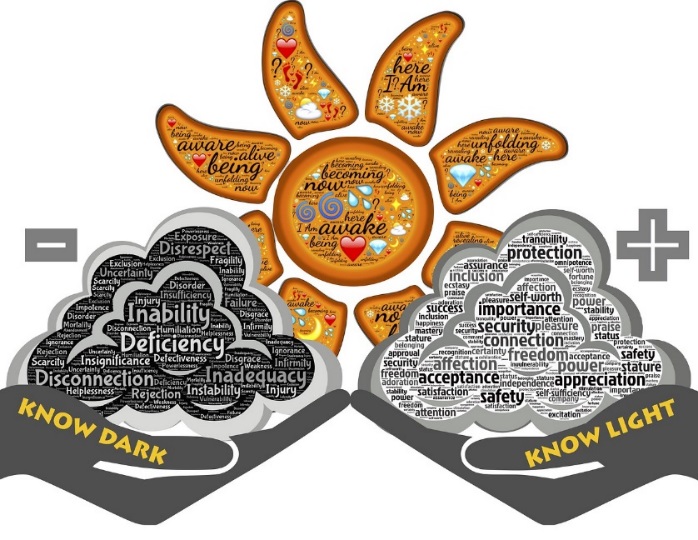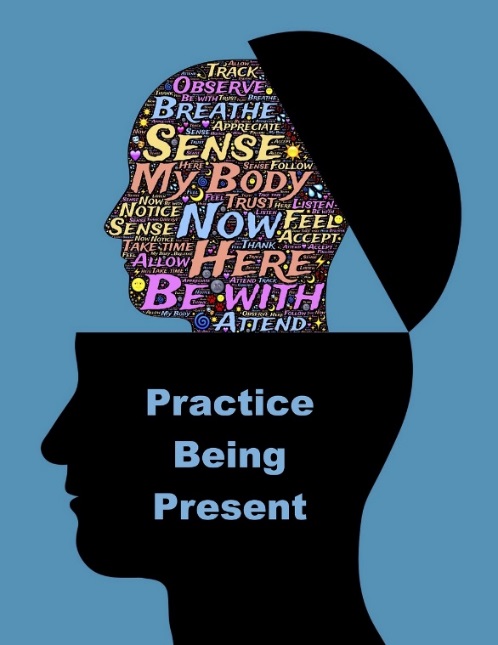Being mindful (present and conscious) is the answer to a healthy mind and body and happy life. But what exactly is mindfulness and what are the benefits of mindfulness? How can it benefit you in your day-to-day life?
Many people are confused about how to practice mindfulness. And others think they are being mindful when in fact they have misunderstood what it means to be mindful.
Let’s learn what mindfulness really is, where it came from, and ten solid benefits that mindfulness can bring into your life.
What Is Mindfulness?

Mindfulness – to focus on the present moment with intention, and to accept it without judgment.
Being mindful means that you are able to maintain a moment-by-moment awareness of your:
- Feelings
- Thoughts
- Body sensations
- As well as what is going on in your surrounding environment
It means that you aren’t so focused on the past or the future that you are missing what is happening right now.
Being mindful also means that you are accepting of your thoughts and feelings without judging them, or believing that they are right or wrong.
In simple terms, it means that you are aware of everything going on around you and how it makes you feel.
Origins Of Mindfulness
Being mindful or living in the present moment originated in Eastern philosophies thousands of years ago.
But anyone of any faith or religion or not can practice mindfulness since it doesn't enforce any religions beliefs.
Daily Mindfulness Practice

Click Here to Discover 7 Minute Mindfulness
You can practice being mindful in your everyday life by staying present in the moment. Focusing on the past or worrying about the future is not living in the present moment or being mindful.
You can apply mindfulness in many everyday situations. Usually, we attempt to multitask all day. We worry about something while we're doing something else. That doesn't work very well.
Our culture teaches that we should be getting as much done as possible. This leads to stress, health issues, burnout, and low productivity.
Mindfulness offers the opposite. Being mindful means you are in the present moment. You are fully here, now.
For example, mindful eating means paying attention to each bite, instead of mindlessly gulping down your food while watching a television show.
Another example of being mindful in your day-to-day life is staying in the moment of what you are doing. So instead of worrying all day while at work about the horrific traffic waiting for you, you focus on what you are doing each moment of the day and stay present at that moment.
Whatever you're doing, give it your full attention. Put down other worries and be present in what you are doing and who you're with.
Remaining mindful in your daily life takes practice. Most people are so used to living in the past or the future that they let the present moment slip away unnoticed and un-enjoyed.
While we may not have control over what happens in life, we do have control over how well we are prepared to deal with it. Mindfulness promotes calm, clarity and focus to that end.
Here is a mindfulness meditation practice.
Mindful Meditation
This mindfulness meditation helps hone the skill of being mindful. It is unique in that it is not trying to change who you are. But instead, it is helping you to become aware of what is already true and happening moment by moment.
There are many different techniques to practice being mindful. But the most popular is the sitting mindful meditation. The steps are as follows:
- Set up your space. If you don't have a room in your home to devote to meditating, simply set up a corner of a room or a spot where you can be quiet and free of distractions.
Choose a comfortable seat. You can sit on the floor, a chair, or a cushion. The point is to have a comfortable stable seat. If you lie down, you are likely to fall asleep, so this is not advised. - Sit upright, but not rigid. Your back should be straight with a natural curve in your lower back. Rest your hands on your thighs, facing down, and let your gaze rest about four to six feet in front of you. You aren't going to be staring hard at what is in front of you, rather just looking at what is there. You just want your gaze to fall wherever is most natural.
- You are going to sit this way for 10 minutes.
- If your mind wanders, gently bring it back to your body and your environment. Don't be too hard on yourself if your thoughts take over. Just keep returning to the present moment over and over.
- After a few minutes, notice your breath. Don’t try to control or count it, just notice how your body is while you are breathing in and out.
- Finally, you are going to allow your thoughts to happen. You may notice that you become so caught up in your thoughts that you forget you are in the room. This is normal. Just gently bring yourself back to the room.
Do this for ten minutes to start and work yourself up to about thirty minutes a day or several times per week.
With practice, you can master this skill and the rewards will serve you for a lifetime.
10 Health Benefits of Mindfulness

1. Mindfulness Minimizes Stress
In today's society, we struggle with stress from all sides.
Our mind never gets a break from all our worries. This is why we are totally burned out, and stressed to the point of needing medication.
Worry robs you of job. You may be familiar with it: You're at work, stressed about and imposed time limit or deadline. Simultaneously you're recalling some conflict with your partner or coworker. To top it off you're fretting about a birthday party you're supposed to attend tonight…
Holding this type of stress leads to:
- Insomnia
- Anger
- Panic attacks
- Low energy
- Irritability
- Defensiveness
- Depression
- Neck and back pain
- A cloudy mind
Our bodies and mind were not made to handle constant stress. It is much healthier to be present and focus on the present moment
Many studies have shown that practicing mindfulness is essential for reducing stress.
2. Mindfulness Boosts Working Memory and Cognitive Flexibility

It appears that mindfulness is also effective at boosting the working memory. For example, a 2010 study (Jha et al), documented the benefits of mindfulness meditation on two groups of military members who were under a lot of stress as they prepared for deployment.
The study showed that the non-meditating military group experienced decreased working memory.
The meditating military group experienced an increase in their working memory capacity.
Practicing mindfulness can also help you have greater cognitive flexibility. People who practice mindfulness are more skilled at practicing self-observation. This allows you to recover faster if you are being negatively provoked.
3. Higher Relationship Satisfaction
It's the ego that prevents healthy relationships. Of course, we need ego, but there are two types: A healthy ego and an unhealthy ego (i.e., a neurotic ego). A healthy ego can observe itself and circumstances without reacting. A neurotic or unhealthy ego is driven by fear and desire. An unhealthy ego can be expressed by defensiveness, arrogance, playing a victim, feeling the need to control others and situations.
You can move from an unhealthy ego to a healthy ego by practicing mindfulness.
Studies have shown that mindfulness protects against the emotional stress of relationship conflict. Studies have also shown that mindfulness helps you to express yourself better.
4. Enhanced Self-Love and Acceptance and Increased Optimism

Practicing mindfulness encourages positive thinking and positive emotions. It promotes the development of self-love and acceptance as well as feelings of competence about your life.
When you are practicing mindfulness, you are more open to accepting things just as they are. Acceptance is a self-loving behavior and suffering comes from non-acceptance. Mindfulness meditation encourages focusing on the now and not focusing on the future or the past.
By not worrying about what is going to happen in the future or looking back at the past, you can cultivate a higher level of optimism.
5. Increased Gray Matter In The Brain
In a study reported by Sara Lazar, Ph.D., a group of Harvard neuroscientists experimented on sixteen subjects. They conducted a week-long course on mindfulness meditation and integrated mindfulness into daily activities.
At the end of the study, MRI scans taken of the subjects. The scans showed that gray matter increased in areas of the brain that regulate emotions, perspective, memory, and learning.
6. Reduces Alcohol And Substance Abuse
According to a University of Washington researcher, Sarah Bowen, substance abuse is an example of how we seek pleasure and avoid pain.
Mindfulness cultivates moment to moment, and an awareness of our thoughts, feelings, and surroundings. Using mindfulness teaches people how to name and tolerate the craving and negative emotions instead of avoiding them.
7. Increased Pain Tolerance and Pain Relief
A research group from the University of Montreal compared pain levels in 26 subjects. Thirteen of the subjects were Zen masters and the rest were non-practitioners. They exposed all subjects to equal degrees of painful heat while measuring their brain activity through MRI.
They discovered that the Zen practitioners reported less pain than the non-practitioners did.
Interestingly, they even reported less pain than their MRIs showed them to have. This indicates that while their brains may have the same level of pain signals, there was actually less pain.
The Wake Forest Baptist Medical center conducted a study using fifteen healthy volunteers who were new to meditation. These volunteers attended four twenty-minute classes to learn mindfulness meditation. Both before and after the training, the participant's brain activity was examined by MRI while the pain was being inflicted using heat.
The study showed that the participants were able to dramatically lower pain. Mindfulness produced about a 40% reduction in pain intensity while morphine typically reduces pain intensity by just 25%.
8. Mindfulness Fosters Creativity
A research conducted by the Leiden University in the Netherlands demonstrated that the practice of mindful meditation had positive effects in both creativity. Participants who followed the practice performed better when given a task to creatively come up with new ideas.
9. Decreased Inflammatory Disorders
A study conducted in France showed that mindfulness meditation reduced pro-inflammatory genes.
When there is a faster physical recovery from a stressful situation, there was a correlation to reduced levels of pro-inflammatory genes.
It was concluded that mindfulness techniques were more effective in relieving the inflammatory symptoms of asthma, rheumatoid arthritis, and inflammatory bowel disease than other activities that promote well-being.
In the study, two groups of people were exposed to different methods of stress control. One group received mindfulness training while the other received nutritional education, exercise, and music therapy.
Recent research published in the journal Brain, Behavior and Immunity stated that thirty minutes of daily mindful meditation reduced the risk of Alzheimer's. The study done by UCLA researchers followed a group of forty men and women aged between fifty-five and eighty-five.
They separated the participants into two groups. One was asked to take part in weekly two-hour mindfulness meetings, and one who didn't practice mindfulness. The results were that the group who participated in the mindfulness group was less likely to suffer from Alzheimer's because of substantially reduced expression of inflammation-related genes.
10. Reduces Emotional Eating and Supports Weight Loss
Mindfulness meditation helps with the reduction of stress while increasing your level of awareness.
Your body releases the hormone cortisol in response to stress. When cortisol is released, there is an increase in insulin resistance, which results in food cravings your body doesn't need.
When you practice mindfulness meditation there is less stress and you are able to confront your emotions without turning to food.
Final Thoughts

Now that you have read the effects that mindfulness can have on your body, mind, and quality of life, it is clear to see that there are many benefits that come from practicing mindfulness, and mindful meditation.
In fact, some of the ways that being mindful can affect your life may even surprise you. Practicing mindfulness will bring positive benefits to your emotional, mental, and physical well-being as well as how you interact socially.
While learning how to practice being mindful is going to take some time and effort on your part, you will find that it is more than worth it when you begin to notice the benefits it is bringing to your life as well as to those who are around you.
Everyone wants to be less stressed and happier in his or her lives, and being mindful is a great way to accomplish just that.
Keep in mind that being mindful is not the same as ignoring what is going on around you. It is not the same as clearing your mind of all thoughts; instead, you are going to be more focused on what is happening around you and more accepting of how you are reacting to those same things within the present moment.
This method will make you calmer than a hardcore seasoned meditator…
I'm talking about a way to sink in relaxation and feel tremendously positive and happy within minutes. It will teach you how to overcome any problem that you may be facing.
And it only takes 7 minutes!
Follow this link: 7 Minutes to Mindfulness




Mindfulness has been a cornerstone of theories of many psychologists. The internet makes this a more wide known practiced skill with everyday folks which is a good thing. There are so many day to day triggers that can take you out of the present without you knowing. Different sights, sounds, or smells that can take you to that long hidden memory you have deep inside your head which can be good or bad.
Your mindful mediation practice tips are great ways to help practice bringing yourself back in the moment. The more you practice a skill the better you get at it. And being mindful is definitely a skill to be practiced.
And I have found all of the 10 benefits of mindfulness practice a part of keeping my life balanced helping me to be true to myself. At times it may be hard but nonetheless I just remember what its like to be out of balance I quickly regain my mindfulness practices again. Thank you for the article.
Lisa
thanks for your wise words, Lisa!